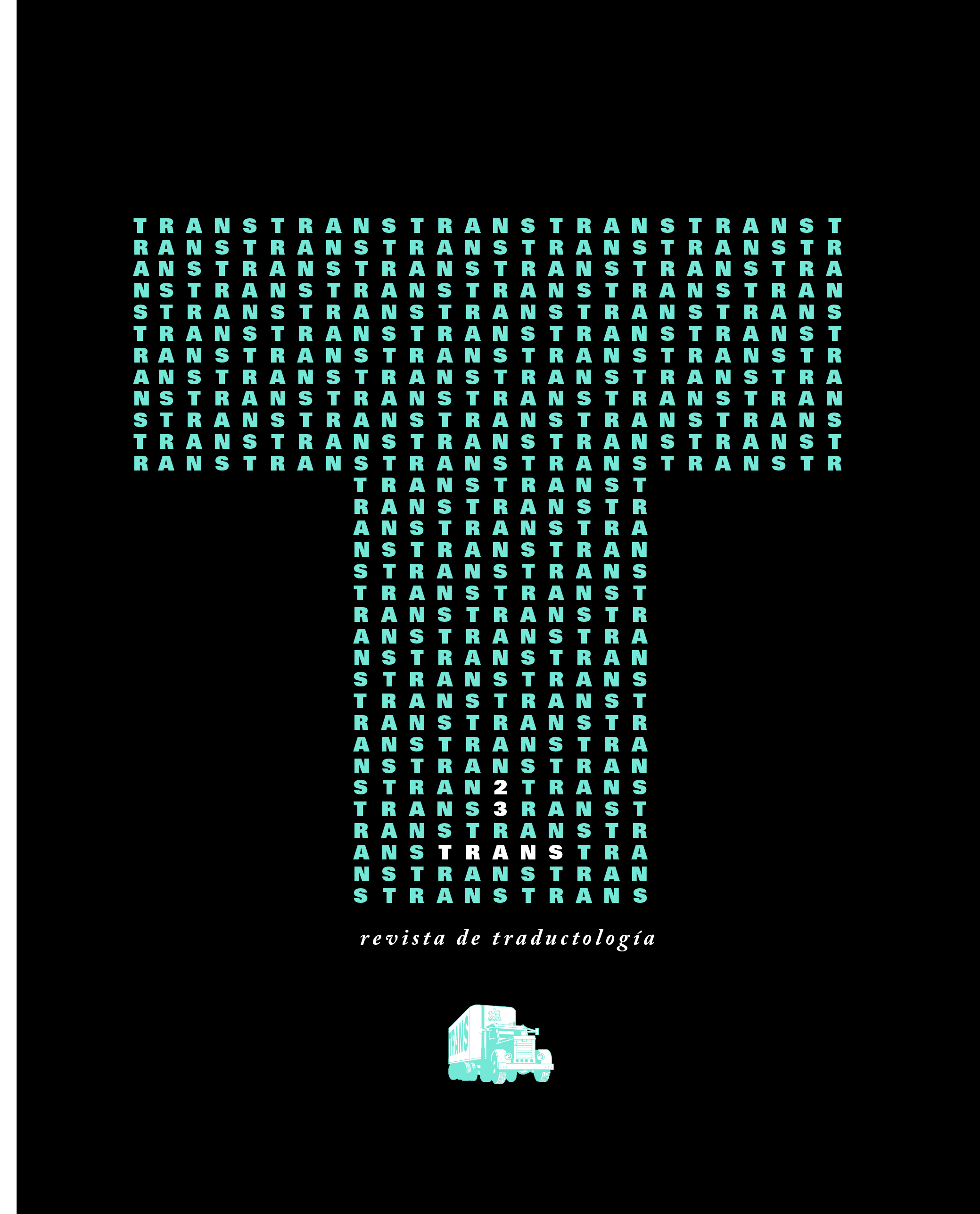The role of ideology in the canonization in the USSR of Julio Cortázar’s literary work
DOI:
https://doi.org/10.24310/TRANS.2019.v0i23.5135Keywords:
Cortázar, translation, symbolic violence, ideology, Soviet literary fieldAbstract
The literary production by Julio Cortázar, featuring narrative experiments and a metaphysical quest, a priori did not fit into the dominant poetics of realistic literature at the service of socialism officially imposed in the USSR. However, his texts were translated into Russian from the beginning of the 1970s. This paper studies the mechanism of the introduction and canonization of Cortázar’s writings in the Soviet literary field, highly conditioned by the state power, as well as the double role of literary criticism which served both as a tool of symbolic violence used by the State and as a form of resistance against it, adopted by editors and cultural mediators.
Downloads
Metrics
Publication Facts
Reviewer profiles N/A
Author statements
Indexed in
-
—
- Academic society
- N/A
- Publisher
- Universidad de Málaga
References
BAER, Brian James (2016): Translation and the Making of Modern Russian Literature, New York: Bloomsbury Academic.
BAGNÓ, Vsévolod (1999): «Mesto pod nazvaniem Cortázar», en Julio CORTÁZAR, Vratá neba, San Petersburgo: Ámfora, 5-30.
BAI, Evgueni (1984): «Borez za svobodu», Izvestia, 18 de febrero, 4.
BORÍSOVA, Alla (2016): Entrevista telefónica el 19/11/2016, San Petersburgo.
BOURDIEU, Pierre (1991): «Le champ littéraire», Actes de la recherche en sciences sociales, 89, 3-46.
BOURDIEU, Pierre (1996): Raisons pratiques : sur la the?orie de l’action, Paris: Éditions de Seuil.
BOURDIEU, Pierre y Loic J. D. WACQUANT (1992): «The Practice of Reflexive Sociology», en An Invitation to Reflexive Sociology, Chicago: The University of Chicago Press, 218-260.
BRAGUÍNSKAYA, Ella (1971): «Julio Cortázar i ego rasskazy», en Julio CORTÁZAR, Drugoe nebo, Moscú: Judózhestvennaya literatura, 5-20.
BYLÍNKINA, Margarita (1970): «Dve novelly», Inostránnaya literatura, 1, 7-8.
BYLÍNKINA, Margarita (1971): «Predislovie: Julio Cortázar "Material dlia vayania"», Latínskaya Amérika, 2, 131-133.
BYLÍNKINA, Margarita (2005): Vsegó odín vek, Moscú: Grifón.
CORTÁZAR, Julio (1984): «Julio Cortázar: eta revolutsia i est kultura», Latínskaya Amérika, 6, 104-110.
CORTÁZAR, Julio (2000): Cartas en 3 tomos: 1937-1963, 1964-1968, 1968-1983, ed. por Aurora Berna?rdez, Buenos Aires: Alfaguara.
CORTÁZAR, Julio (2012): Cartas en 5 tomos: 1934-1954, 1955-1964, 1965-1968, 1969-1976, 1977-1984, ed. por Aurora Berna?rdez y Carles Alvarez Garriga, 2.a ed., Madrid: Alfaguara.
CORTÁZAR, Julio (2013): Clases de literatura: Berkeley, 1980, Madrid: Alfaguara.
EVTUSHENKO, Evguéni (1980): «Dialog v masterskoi pisátelia», Literatúrnaya gazeta, 6 de febrero, 15.
FOUCAULT, Michel (1980): Power/Knowledge. Selected Interviews and Other Writings 1972-1977, New York: Pantheon Books.
FUENTES, Carlos (2004): Julio Cortázar por Carlos Fuentes, <http://www.lamaquinadeltiempo.com/cortazar/fuentes.htm> [consulta: 16-V-2017].
KORIONOV, Vitali (1985): «Dvizhenie solidárnosti: Shíritsia podderzhka spravedlivoi borbý naródov Latinskoi Amériki», Pravda, 21 de enero, 5.
LYOTARD, Jean-François (1979): La Condition postmoderne : rapport sur le savoir, Paris: Éditions de Minuit.
«Marcos Aguinis: "Kultura - resultat tvórchestva vsegó naroda"», Latínskaya Amérika, 1984 (10), 115-122.
MEDVEDENKO, Anatoli (1969): «Kongréss pisátelei Latinskoi Amériki», Literatúrnaya gazeta, 27 de agosto, 3.
ÓGNEVA, Elena (1978): «Fantastícheskoe po Cortázaru», Inostránnaya literatura, 8, 265-267.
OSPOVAT, Lev (1976): «Poiski i otkrytia Julio Cortázara», en Julio CORTÁZAR, Vyigryshi. Póvesti i rasskazy, Moscú: Progress, 5-24.
«Predislovie: My tak lúbim Glendu», Literatúrnaya gazeta, 15 de febrero de 1984, 15.
RAMA, Ángel (1981): «El ‘boom’ en perspectiva», en David VIÑAS (ed.), Más allá del «boom»: literatura y mercado, México: Marcha, 51-110.
RGALI (1966): fondo 1573, lista 4, dossier 334.
RGALI (1967): fondo 1573, lista 5, dossier 739.
RGALI (1968): fondo 613, lista 10, dossier 5269.
RGALI (1971a): fondo 1573, lista 4, dossier 338.
RGALI (1971b): fondo 613, lista 10, dossier 5347.
SCHIPÁGINA, Liudmila (1984): «Matagalpa jóchet mira», Pravda, 16 de abril, 6.
SHERBAKOV, Konstantin (1979): «Chilíiskaya kultura zhivá!», Literatúrnaya gazeta, 16 de mayo, 9.
TEITELBOIM, Volodia (1984a): «Julio Cortázar», Casa de las Américas, 145-146, 47-58.
TEITELBOIM, Volodia (1984b): «Putí i nadezhdy Julio Cortázara», Inostránnaya literatura, 8, 173-179.
TERTERIÁN, Inna (1974): «Noveishi paradoksalist», Inostránnaya literatura, 7, 226-234.
TERTERIÁN, Inna (1982): «Pylaushi pépel kostrá », Literatúrnaya gazeta, 29 de septiembre, 15.
TERTERIÁN, Inna (1984): «Predislovie: Nochnaya shkola», Literatúrnaya gazeta, 19 de septiembre, 15.
TERTERIÁN, Inna (1985): «Julio Cortázar: Igra vzapravdu», en Julio CORTÁZAR, 62. Model dlia zborki. Rasskazy, Moscú: Raduga, 3-21.
TERTERIÁN, Inna (1988): Chelovek mifotvoriashi. O literature Ispanii, Portugalii i Latinskoi Amériki, Moscú: Sovetski pisátel.
VELLER, Mijail (2003): Dolina ídolov, San Petersburgo: Parol.
ZMÉEV, Serguéi (1979): «Vstuplenie. Apocálipsis Solentiname», Inostránnaya literatura, 6, 183-184.
Downloads
Published
How to Cite
Issue
Section
License
All contents published in TRANS. Revista de Traductología are protected under the Creative Commons Attribution-NonCommercial-ShareAlike 4.0 International (CC BY-NC-SA 4.0) license. All about this license is available in the following link: <http://creativecommons.org/licenses/by-nc-sa/4.0>
Users can copy, use, redistribute, share and exhibit publicly as long as:
- The original source and authorship of the material are cited (Journal, Publisher and URL of the work).
- It is not used for comercial purposes.
- The existence of the license and its especifications are mentioned.
- ShareAlike — If you remix, transform, or build upon the material, you must distribute your contributions under the same license as the original.
There are two sets of authors’ rights: moral and property rights. Moral rights are perpetual prerogatives, unrenounceable, not-transferable, unalienable, imprescriptible and inembargable. According to authors’ rights legislation, TRANS. Revista de Traductología recognizes and respects authors moral rights, as well as the ownership of property rights, which will be transferred to University of Malaga in open access.
The property rights are referred to the benefits that are gained by the use or the dissemination of works. TRANS. Revista de Traductología is published in an open access form and it is exclusively licenced by any means for doing or authorising distribution, dissemination, reproduction, , adaptation, translation or arrangement of works.
Authors are responsable for obtaining the necessary permission to use copyrighted images.













21.png)
